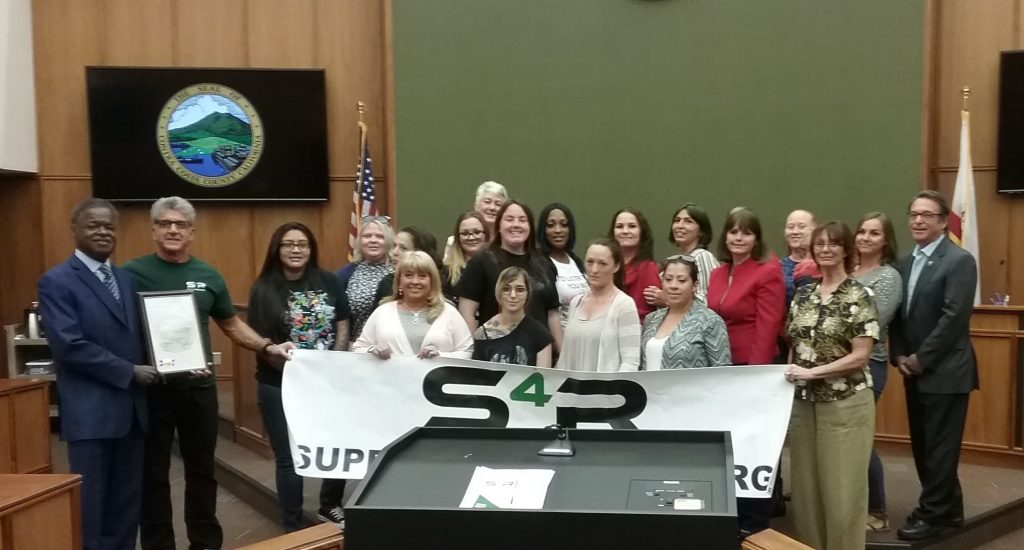Kramer, Board Chair Gioia unable to attend meeting
By Daniel Borsuk
Contra Costa County Assessor Gus Kramer was censured on sexual misconduct charges by the County Board of Supervisors on a 4-0 vote Tuesday, paving the way for a potential lawsuit by the longtime elected official. Board Vice Chair John Gioia was absent at the meeting because he was touring the tar sands of British Columbia as part of a joint tour for serving as a Board Director on both the California Air Resources Board and the Bay Area Air Quality Management District.
Elected to the county assessor post since 1994, Kramer was represented by his attorney Bruce Zelis of Walnut Creek. He warned supervisors before taking action that the assessor had sought a continuance on the board censure item because of Kramer’s inability to attend the meeting and because of questions that arose about whether the supervisors had violated the Ralph M. Brown Act, the state public meeting law.
Kramer’s attorney also questioned whether the board can discipline an elected official for actions he allegedly committed three years ago and there have been no similar charges leveled against him since then.
Zelis also questioned whether the board can discipline a countywide elected official, which conflicts with the board’s resolution recommendation that states:
“There are six county departments that are managed by elected department heads: the Assessor, Auditor, Clerk-Recorder, District Attorney, Sheriff, and Treasurer-Tax Collector. These elected officials are responsible for managing the county employees who work in their departments. The Board of Supervisors does not have the power to discipline elected officials when their conduct fails to meet the standards of behavior expected of all other county department heads.”
Obviously, supervisors went against the resolution recommendation and moved to censure the county assessor, who last year earned $221,946.80 before benefits.
Zelis refused to comment further with the Contra Costa Herald about the Brown Act violation allegations or other issues about Kramer’s case, but Board Chair Karen Mitchoff of Pleasant Hill said there were no Brown Act violations when she and vice chair Gioia consulted over the proposed Kramer censure resolution prior to the meeting.
“We did not confer with our colleagues,” Mitchoff said.
This may not be the end of line for County Assessor Kramer case. The Contra Costa County Civil Grand Jury will now be handed the case to determine if the allegations involving the assessor and two female employees merit additional investigation.
Supervisors acted on a 2018 outside independent attorney investigation on two charges of sexual harassment dating back to 2015 by two initially unidentified Assessor Department female employees, one of whom has since been identified as associate assessor Margaret Eychner, a resident of Walnut Creek.
“The investigator found that, prior to mid-2015 it is more likely than not that Mr. Kramer made certain comments and engaged in conduct that two individuals who worked in his department considered to be offensive and inappropriate in the workplace.” a board report stated.
In the board’s resolution, the supervisors found “there was sufficient evidence to prove Assessor Kramer had engaged in the following conduct in 2014 and 2015:
- Kramer frequently visited the complainant’s cubicle on the first floor and the complainant frequently visited Mr. Kramer’s office during 2014 and up to March 2015. During these visits they discussed work related and nonwork-related matters.
- On one occasion Mr. Kramer told her that he had given a vibrator to a woman (not a county employee) as a gift. She thought that this was inappropriate and offensive.
- Mr. Kramer sent her two text messages in 2014 that she believed suggested a romantic/sexual interest in her. She considered the texts to be inappropriate an unwelcome.
- In May 2014, he offered her a rose, which she interpreted to be a romantic gesture.
- As to the second employee/witness, there was sufficient evidence to indicate that Mr. Kramer made a comment in her presence in 2008 and told a story in her presence in 2013 concerning his social interactions with women that she thought were inappropriate and offensive; and that on one occasion in 2015 he made a comment to her that she believed was intended to be sexually suggestive and considered inappropriate, offensive and unwelcome.”
The independent attorney investigator found that evidence did not show Assessor Kramer, who earned $221,946.80 in salary only in 2017, had retaliated against the two employees or had acted to “negatively impact their careers.” In addition, the investigator’s evidence did show the assessor stopped making inappropriate and offense comments of a sexual nature to both employees after he learned of their complaints in 2015. No further harassment complaints from the two employees or other employees have been lodged against the Assessor Kramer since June 2015.
“This is not a witch hunt and perhaps there wasn’t any retaliation,” said Supervisor Candace Andersen of Danville, “but you have to remember the county had to pay $1 million in a sexual related case involving the assessor in 2009.” Andersen was referring to a $1 million settlement paid to Assessor department employee Bernice Peoples in 2009 that Kramer had sexually retaliated against her.
“I want all our employees to feel safe and comfortable,” said Supervisor Diane Burgis of Brentwood after voting in favor of the censure resolution.
Supervisor Federal Glover of Pittsburg did not comment on this item.
Sandy Hook Promise Impresses Supervisors
A Contra Costa County Office of Education presentation on the nationally acclaimed Sandy Hood Promise, a non-profit organization designed to prevent gun violence on K-12 school campuses, won endorsements from all four supervisors in attendance. Supervisors plan to place a resolution of endorsement on its next board meeting agenda slated for Sept. 11.
Sandy Hook Promise and the county office of education and eventually 18 public K12 school districts in the county are expected to work with the no-cost program that Sandy Hook Promise Vice President of Field Operations Paula Fynboh says is based on a heavy emphasis on student mental wellness.
“You brought us a great gift,” remarked Supervisor Burgis. “You have my personal support.”
County Real Estate Fraud Unit Reviewed 71 Cases in 2017/2018
Supervisors also approved without comment the District Attorney Office’s annual real estate fraud report for the 2017/2018 fiscal year during which time the Real Estate Fraud Unit reviewed 71 real estate fraud cases, an increase from 64 cases that were reviewed during the 2016/2017 fiscal year.
“Within the last year, our office has secured felony convictions in 3 different cases and has conducted preliminary hearings against another 7 defendants in complex white-collar fraud cases, involving over 2 million dollars in stolen assets,” wrote Deputy District Attorney Adam Wilks, who leads the Special Operations-Real Estate Fraud.
Because real estate fraud is a sophisticated crime targeting especially senior citizens, Wilks wrote: “Within the last year, the Real Estate Fraud Unit restored title to the home of an elderly woman after the home was fraudulently slated for foreclosure auction. This unit is currently working with federal prosecutors to help elderly victims of a foreclosure scam in operating around the Bay Area.”
Wilks reported that in the 2016/2017 fiscal year the Real Estate Fraud Unit tracked international cases as far away as Nigeria. “These investigations involve rental fraud, forgery, embezzlement, foreclosure consultancy fraud, short sale fraud and elder abuse,” he reported.
Established in July 1996 by the board of supervisors, the DA’s Real Estate Fraud Prosecution unit is staffed with one deputy district attorney, one senior inspector and one legal assistant. Last fiscal year, the unit spent $399,705 for salaries, benefits, travel and necessary services.
Resolution Boosts Two County Airports Economic Assets
Supervisors unanimously gave the county’s two airports – Buchanan Field Airport in Concord and Byron Airport – an economic boost in the form of a resolution recognizing the contributions of the two airports to the aeronautical community and economic growth of the county.
The resolution materializes when the airports, especially Buchanan Field Airport, has drawn increased development interest. The City of Concord has made overtures to annex the airfield, but Board Chair Mitchoff, whose District 4 covers the Concord air field, said, “There is no way, no how that the city of Concord will annex the air field. It is an economic asset for the county.” Both airports are self-sufficient and do not need to use county general fund money to cover expenses. Instead both airports are moneymakers contributing about $2.77 million to the county general fund, $1.2 million to local schools, and $273,216 to other public entities from associated possessory interest and sales tax.
The supervisors’ resolution boasts how the two airports provides a base of operation to over 600 aircraft, generated about $106 million in total direct and indirect annual economic output in 2016, which includes the creation of 828 jobs, $8 million in state and local revenue and $10.2 million in federal tax revenue.
 By Daniel Borsuk
By Daniel Borsuk














 Mitchoff calls for calm over proposed Concord detention center
Mitchoff calls for calm over proposed Concord detention center
 By Daniel Borsuk
By Daniel Borsuk













